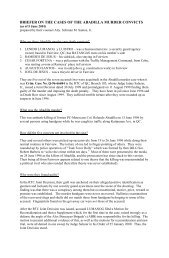Republic of the Philippines - Campaign
Republic of the Philippines - Campaign
Republic of the Philippines - Campaign
You also want an ePaper? Increase the reach of your titles
YUMPU automatically turns print PDFs into web optimized ePapers that Google loves.
APPELLANTS’ BRIEF<br />
People <strong>of</strong> <strong>the</strong> <strong>Philippines</strong> vs. Fortuna, et. al.<br />
S. C. G. R. No. 141660-64<br />
this case when <strong>the</strong> latter allegedly executed <strong>the</strong>ir extra-judicial<br />
confessions.<br />
We are duty bound to raise to this Court’s attention, and it might also interest <strong>the</strong><br />
Court to note, that in <strong>the</strong> cases <strong>of</strong> People vs. Deniega and People vs. Suela where <strong>the</strong><br />
extra-judicial confessions <strong>of</strong> <strong>the</strong> accused were not admitted in evidence, all <strong>the</strong> accused<br />
complained <strong>of</strong> torture and violence by <strong>the</strong> police investigators who extracted said<br />
confessions from <strong>the</strong>m. But more interestingly, in both cases, Atty. Confesor B. Sansano<br />
and Atty Florimond Rous were <strong>the</strong> counsels who assisted <strong>the</strong> confessants.<br />
In fact, <strong>the</strong> incompetence <strong>of</strong> both Atty. Sansano and Atty. Rous to serve as<br />
assisting counsels for <strong>the</strong> suspects brought to <strong>the</strong>ir <strong>of</strong>fice was already noted by this Court<br />
in <strong>the</strong>se cases. In People vs. Deniega, <strong>the</strong> Court wrote:<br />
A thorough reading <strong>of</strong> <strong>the</strong> transcripts <strong>of</strong> <strong>the</strong> testimonies<br />
<strong>of</strong> <strong>the</strong> two lawyers, Atty. Sansano and Atty. Rous, indicates that<br />
<strong>the</strong>y appeared less as agents <strong>of</strong> <strong>the</strong> accused during <strong>the</strong> alleged<br />
investigation than <strong>the</strong>y were agents <strong>of</strong> <strong>the</strong> police authorities. In<br />
<strong>the</strong> case before us, it was <strong>the</strong> police authorities who brought <strong>the</strong><br />
accused, handcuffed, to <strong>the</strong> IBP headquarters where <strong>the</strong> services<br />
<strong>of</strong> <strong>the</strong> lawyers were supposedly “engaged.” No details <strong>of</strong> <strong>the</strong><br />
actual assistance rendered during <strong>the</strong> interrogation process were<br />
furnished or alleged during <strong>the</strong> entire testimony <strong>of</strong> <strong>the</strong> lawyers in<br />
open court. The bulk <strong>of</strong> <strong>the</strong> lawyers’ oral testimonies merely<br />
gave <strong>the</strong> trial court assurance that <strong>the</strong>y supposedly explained to<br />
<strong>the</strong> appellants <strong>the</strong>ir constitutional rights, that <strong>the</strong> signatures<br />
present were <strong>the</strong>ir signatures and those <strong>of</strong> <strong>the</strong> accused, and that<br />
<strong>the</strong> accused agreed to having <strong>the</strong> lawyers assist <strong>the</strong>m during <strong>the</strong><br />
process <strong>of</strong> custodial investigation. (People vs. Deniega, 251<br />
SCRA 627, 635)<br />
In People vs. Suela, <strong>the</strong> Court again had <strong>the</strong> opportunity to comment on Atty.<br />
Sansano’s lack <strong>of</strong> proper understanding <strong>of</strong> his role as counsel for a suspect during a<br />
custodial investigation.<br />
“Evidently, Atty. Sansano did not understand <strong>the</strong> exact<br />
nature <strong>of</strong> appellants’ rights to counsel and to remain silent during<br />
<strong>the</strong>ir custodial investigations. He viewed a refusal to answer as<br />
an obstruction in <strong>the</strong> investigation. This shows that he was<br />
incapable or unwilling to advise appellants that remaining silent<br />
was a right <strong>the</strong>y could freely exercise without fear <strong>of</strong> any<br />
untoward consequence. As counsel, he could have stopped his<br />
clients from answering <strong>the</strong> propounded questions and advised<br />
<strong>the</strong>m <strong>of</strong> <strong>the</strong>ir right to remain silent, if <strong>the</strong>y preferred to do so.<br />
That <strong>the</strong> process <strong>of</strong> investigation could have been “obstructed”<br />
Page 75 <strong>of</strong> 127<br />
75




